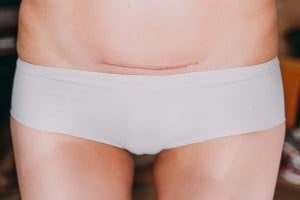Having the ability to grow a human within our bodies is incredible. Women possess the superpower to take that even further and use our breasts to feed that human. But with all the glory that comes with breastfeeding, there is so much that no one mentions. Yes, breastfeeding is rewarding and beautiful. The bonding between mother and child is unlike anything else in the world. However, with so much focus on the “natural” aspect of breastfeeding, there’s very little that highlights its challenges. It can be overwhelming, physically and emotionally painful, and sometimes even traumatizing.
If you are a newly postpartum mother trying to make sense of breastfeeding your newborn, read on to hear what other mothers who have been there wanted you to know. An open forum of thousands of breastfeeding mothers helped create this list of things no one wants to tell you about breastfeeding to help you feel less alone on your journey.
1. It is So Damn Hard
Yes, breastfeeding can be beautiful. But it can also be isolating, lonely, and mentally and physically exhausting. There’s so much out there about how natural it is, which may be true for many women. But many others shared with me how breastfeeding all day, every day for months and years, took a toll on their bodies mentally and physically. Women spoke about being holed up in a room away from everyone at a family party, begging their newborn to latch so they could rejoin the crowd.
Other women shared how they plan their family outings around feedings so they could return home to nurse their baby rather than risk doing it in public with the fear of public shame. Still more women spoke about the stress of an oversupply, the nipple pain, the tongue and lip ties, the poor latch, the flange size and replacement of pump parts, and the bleeding and cracked nipples. And don’t get us started about the thrush, clogged ducts, and mastitis. Remember, especially in the early days of breastfeeding, you can be doing everything right, and it can still be challenging.
2. The Leaking of It All
Before I was a nursing mama, I never knew how much leaking occurs when breastfeeding. And not just during nursing. There is milk everywhere, at any time. I was shocked and horrified at how often I had to change my bra and shirt and frustrated at how often my breasts leaked. I also was surprised (and impressed!) by the strength of my milk stream spray. (Breastfeeding Olympics, here I come.) Sure, I knew nursing pads existed, but the constant leaking, especially in the first few weeks of nursing, shocked me. My washer and dryer got a lot of action in those first few months of my newborn’s life.
3. Breasts are No Longer Sexual Body Parts
While breastfeeding, your breasts serve an essential function. They give nourishment and life-sustaining nutrients to your newborn. Yet your partner (and even you) might not realize until it’s too late that what once had a starring role in foreplay might not be currently up to serve the same purpose these days. Having milk shot to the face while getting hot and heavy with your partner might impact the mood for a minute, but it can create a moment of intimacy for new parents as you laugh it off and realize how much more different your life is now than it was just a few short months ago.
4. You Might Stink
Okay, that may be a bit harsh. But you might smell while being a breastfeeding mama, especially in the beginning. You have a stained shirt with leaked milk and spit-up, and you likely haven’t had a shower recently or brushed your teeth. The messy mom bun on top of your head is the icing on the cake. And while I’m not a doctor, the BO that happens because of all the hormonal happenings during breastfeeding needs no medical degree to understand. So, treat yourself to that hot shower, girlfriend! While at it, go online and treat yourself to some nursing-friendly clothes to add to your wardrobe during those late-night feeding sessions. If you must wear a bra 24/7 and clothes that can easily pop a boob out at a moment’s notice, you should look cute doing it.
5. D-MER is a Real Thing
I had no idea what D-MER1 was when I was a newly breastfeeding mom. I knew the first few moments of each pumping or nursing session were depressing and anxiety-inducing. After it happened more than a few times, I finally turned to Dr. Google and typed in “anxiety during letdown” and was immediately inundated with literature about D-MER and its meaning.
I felt validated because I thought this was all in my head and something was wrong with me each time. The feelings of hopelessness, depression, and anxiety (ranging from mild to severe) quickly disappeared but were very difficult to deal with. Things like deep breathing, chugging water during letdown, and talking it through with a supportive person made those excruciating moments bearable. Not all women experience D-MER, but knowing about it can help avoid the Google rabbit hole if it does happen to be something you experience.
6. There is a Major Hormonal Shift That Happens While Weaning
Deciding to stop nursing isn’t something that can happen cold turkey. You must allow your body time to adjust to the lessening milk production. Your hormones are out of whack, and you struggle to keep up with the changes in your body. Listen to your body and remember it’s normal to feel “off” or even have flu-like symptoms while weaning. Going too quickly can risk clogged ducts or mastitis, so take it as slowly as you need. As a breastfeeding mother, the fun guessing game of “when will my period return” is always in the back of your mind. Make sure you’re prepared for it at any moment, as many of us have learned the hard way.
7. You’ll Hear: “That Baby Weight Will Melt Off Once You Start Nursing!”
Yeah. Or not. For some women, the weight gained in pregnancy melts off as soon as they deliver that placenta. For us mere mortals, it happens a bit more slowly. However, these well-meaning phrases can add to the already pressure-filled stress of new nursing mothers. It may also make them feel inadequate when they don’t look like a swimsuit model after the first week of motherhood.
Many women feel extra hungry and thirsty because of breastfeeding and may gain weight while nursing, while others burn calories with ease. Each woman is different, and comparing yourself to your best friend will only serve to give you extra angst you don’t need. Your breasts will undergo many changes in their journey from pre- to post-baby. Embrace the changes and enjoy scrolling your phone for pictures of why they look the way they do.
8. The Judgment
No matter what you do, you will surely be judged by others along your breastfeeding journey, even by those close to you. Well-meaning people are just curious about your new role as a mother and excited over the arrival of your little one. Hearing all the comments from the peanut gallery, however well-meaning they might be, only adds to the stress and anxiety. Amidst the running dialogue in your brain with everything your newborn needs, the last thing you need is to answer questions about your breastfeeding journey.
I found that there was a judgment from start to finish on my breastfeeding journey. That judgment began with whether I was breastfeeding, and now it’s when I will stop. Finding the happy medium with which the masses are comfortable is hard. At the end of the day, how about making a decision YOU are comfortable with? There is also a judgment about breastfeeding in public. We hear, “Go for it! You’re feeding your baby.” Then, in reality, we get stares and glares from those around us, even if we are being discreet. It’s no wonder many women feel uncomfortable whipping out their breasts in public and prefer to stay home on their couch to feed their babies.
9. It’s Okay to Grieve the Journey You Thought You’d Have
Our society tends to shame new mothers about how they choose to feed their newborns. Many women yearn to breastfeed and, for various reasons, may be unable to. It is okay to grieve and mourn the journey you thought you’d have with your newborn if you cannot nurse or pump breast milk for your baby. One size does not fit all, and so much pressure on us as mothers to do things “exclusively” only adds to the mounting stress.
Follow your body cues as well as the cues from your baby. Go for it if you use a nipple shield to help your baby latch better. Instead of thinking of it as a crutch, accept it as a gift from breastfeeding mothers everywhere to help you along your journey. Reframing your mindset can work wonders when shaping how you thought your breastfeeding journey would go. The number of ounces of milk you pump doesn’t equal your value as a woman or a mother.
No matter how you feed your baby, there will always be positives and negatives. Remember that just as you are learning, your baby is learning too. Commit to being on this journey together, and you will embark on an experience that is special for the two of you. While this list may highlight some undesirable aspects of breastfeeding, the truth is breastfeeding is an incredible experience, but it’s not the only way. Find what works for you and your baby, and the rest will fall into place.
























